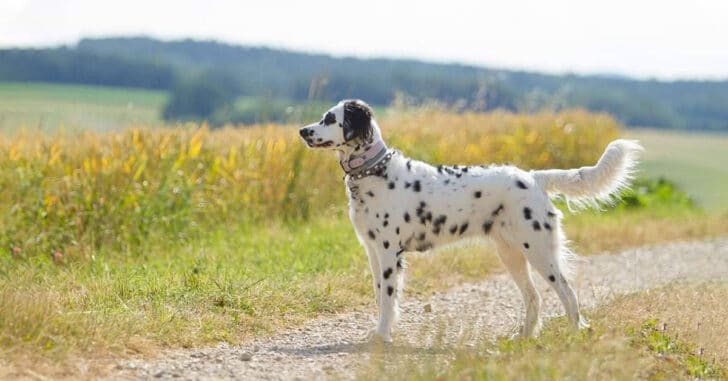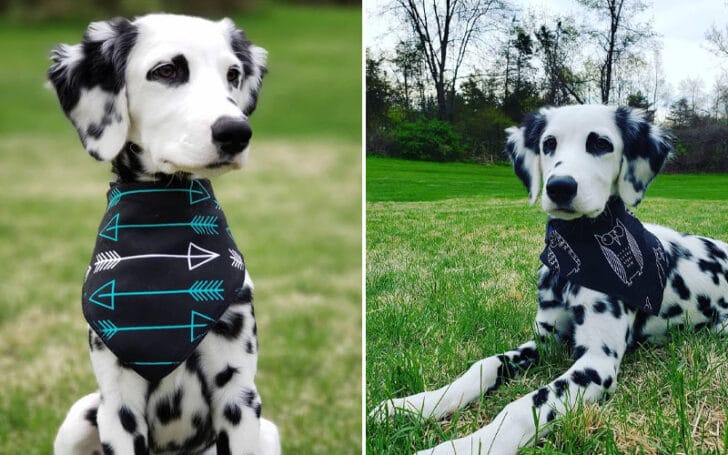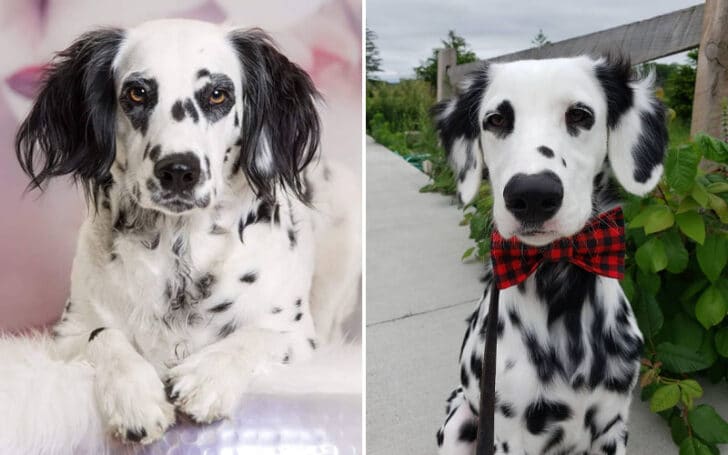Pets
Your Complete Guide to Know Everything About a Long Haired Dalmatian | Temperament, Shedding, & Price
A.K.C. spotted dogs were first registered as dalmatians in 1988.
The longhaired dalmatian is undoubtedly one of the distinctive dog breeds with beautifully spotted coats.
The typical standard for this dog is to have shorthaired white fur with random black spots.
But do you know that it also comes in natural fur and color variations? Yes, you can adopt a purebred mini or fluffy dalmatian with liver, blue, lemon or brown spots.
So, do longhaired dalmatians differ in temperament, health, shedding or prices from shorthaired varieties?
Let’s find out all about this awesome pup to find out if you should adopt!
Table of Contents
Long Haired Dalmatian
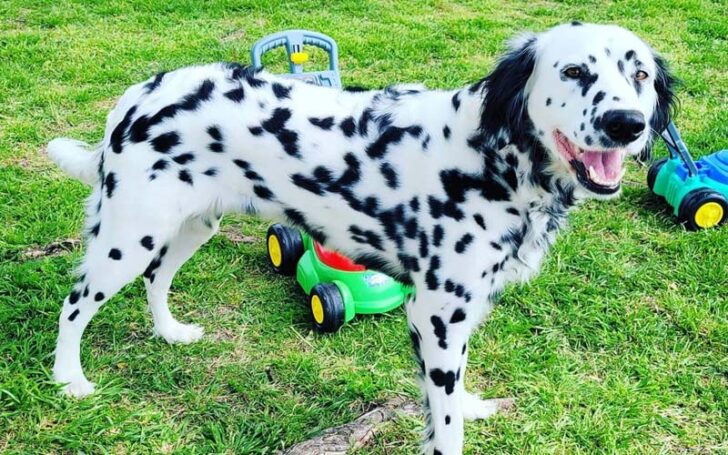
A long-haired dalmatian is a rare fur variant of the usual dalmatian breed. The reason for this different coat variation is a recessive gene.
However, a dalmatian dog’s chances of being longhaired depend on the presence of the recessive gene in the dogs that breed them.
Yes, a purebred dalmatian puppy who has a recessive gene in both parents but may have a long coat variety.
Therefore, two short-haired Dalmatians cannot produce one piece of long-haired puppies.
They may also have pale yellow (lemon), tan, liver, brown, blue, or tricolor markings instead of the typical black and white spotted coat.
Honestly, it all depends on their genes how they look. In general, their appearance is similar to any dalmatian dog breed:
Appearance of Long Haired Dalmatian
Longhaired Dalmatians are like any other Dalmatian breed when they are born.
They usually have a plain white coat with colored spots that may become evident 10-15 days after birth.
These dogs may continue to develop spots on the legs, ears or tail up to 18 months after birth.
Overall, they have a striking medium-sized built body with long and slender legs that make them great runners and athletic like azurian huskies.
Eye Color
They have medium sized round eyes and the common eye color most Dalmatians are born with is brown. But they may also have blue or darker eyes.
Darker eye color is usually seen more in dogs with black and white coats than in other variations.
Height
The average male dalmatian long hair is slightly larger than the female long haired dalmatian. They range in height from 19 – 23 inches (48cm-58cm).
The stunning longhaired Dalmatians are 21 to 23 inches (53cm-58cm) tall for fluffy male Dalmatians and 19 to 22 inches (48cm-56cm) tall for female Dalmatians.
However, height is different for miniature dalmatians, which are selectively bred to have an average size of between 8 and 12 inches (20 cm-31 cm).
Size and Weight
A long-haired dalmatian dog has a standard and mini or miniature size.
The standard is a purebred dalmatian produced due to the recessive gene with different types of long hair. However, the mini dalmatian is bred to have a smaller size than the average dalmatian.
Mini dalmatian puppies can weigh around 18 to 24 pounds. By comparison, the average full-grown dalmatian longhair weighs about 45 to 60 pounds.
Long Coat Dalmatian Colors
All Dalmatians, whether long or short, have white fur at birth. The spots become visible in 10 to 21 days.
The standard spot color is black or liver.
However, the long-haired dalmatian may display different spot colors due to a mutation or recessive gene:
- Brown-colored spots (Liver Dalmatian)
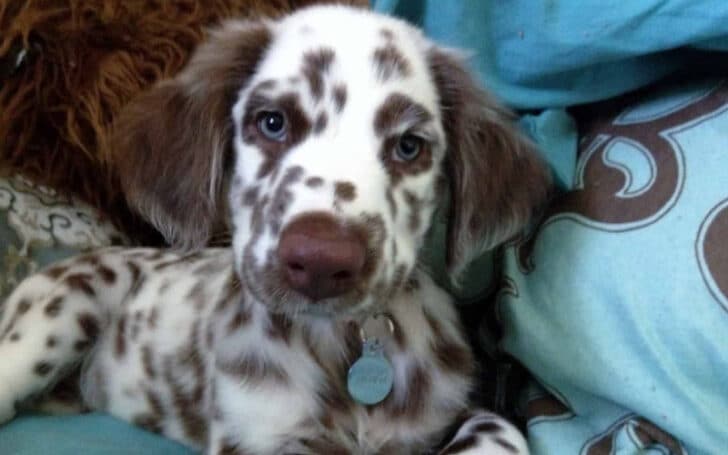
- Pale-Yellow spots (Lemon Dalmatian)
- Orange spotted coat (Orange Dalmatian)
- Tricolor dots; black, white, tan or brown, white, tan (Tricolor Dalmatian)
- Gray-Blue spots (Blue Dalmatian)
Note: Click to read about the blue bay sheepdog with a striking blue fur.
Long Haired Dalmatian Temperament
You may have heard that these affectionate dogs are aggressive and mean dogs, but if you ask real dalmatian owners, the answer may differ from anything you see on the internet.
Yes, they do not have such a good reputation as black Pitbull dogs, but you can train them no matter how you train them. Aggressive behavior, constant barking, stubbornness or mean personality may be due to their poor training.
They are playful, loyal, athletic, protective and extremely energetic. Longhaired dalmatian puppies also have an alpha instinct that drives them to act like kings at home.
This is why they are more likely to act aggressively if you fail to socialize them in the early stages or if you don’t give them enough playtime to let their energy go.
Given the right care, longhaired Dalmatians will be the most loving, protective, silly and friendly dogs you can own!
Long Coat Dalmatian Care
While both short-haired and long-haired Dalmatians require basic grooming needs, things can differ for long-haired Dalmatians:
Shedding
If you’re a Dalmatian lover, you’ve probably seen novice pet owners ask:
Do Dalmatians shed? Or are they easy watchdogs?
Yes, Dalmatians in general are heavy shearers and being long haired makes them shed even more. They also don’t have a specific shedding season and they molt throughout the year.
They have hairs that are 2 to 4 inches long, and without a pet hair remover or cleaner, it can be quite difficult to keep your home dalmatian hair-free.
Grooming
They are heavy shearers and have long, dense, smooth and fluffy coats that require regular grooming and brushing.
So get brush mitts or invest in a pet hair vacuum to maintain the beautiful smoothness and shine of their fur.
Bathing
The gorgeous long coat requires washing once a week or whenever you notice it getting dirty. Give them a clean massage with a gentle pet scrubber to remove any dirt or stains from their fur.
Tip: Don’t forget to clean their ears and trim their nails to keep them clean.
Food
Long-haired Dalmatians tend to produce urate crystals, so they need a low-purine diet or better yet, a vet-prescribed meal plan.
Also, the amount of food for a dalmatian puppy is greater than for an adult long coat dalmatian, so be sure to always measure before introducing food to avoid indigestion.
For example, a baby or albino long-coated dalmatian might eat 4-5 cups of dog food, while an adult might be satisfied with 2-2.5 cups.
Choose to feed them root vegetables and easily digestible meats such as fish or chicken. You can also give your Dalmatian peanut butter or carrots as a snack.
Note: Click to find out if your dog can eat these human foods.
Long Haired Dalmatian Training
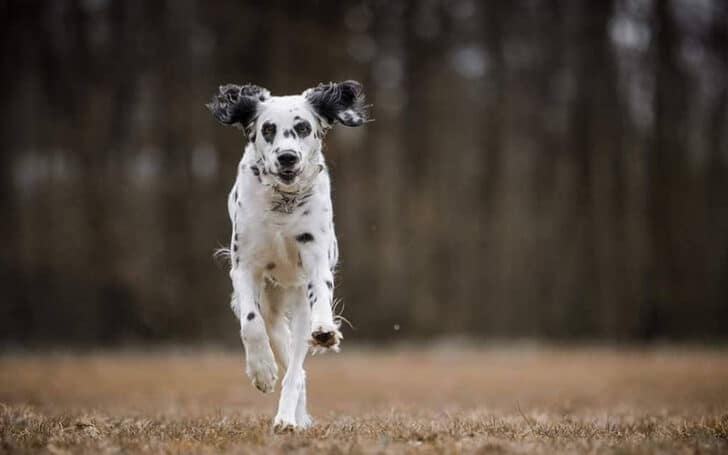
The Dalmatian puppy is one of the energetic dogs that can be owned. They demand an owner who can provide them with enough playtime and space to run.
Daily Exercise
The long-haired dalmatian is a breed bred for running. They are extremely energetic and demand daily exercise time. You can take a 20-minute walk in the morning and evening with a 1-hour training period during the day.
You can run with them or, better yet, play ‘fetch the ball‘ to satisfy your running instincts.
Don’t Do Good When Left Alone
Although Dalmatian puppies are not cute, they show their affection by staying close to their owners. They can become anxious if left alone for long periods of time.
Early Socializing
Like all other breeds, they need early socialization with other people and pets to avoid aggressive behavior.
Obedience Tricks
Long-coated Dalmatians are intelligent and can be quite mischievous during training so it is necessary to use obedience tricks and phrases to let them know who their owner is.
Crate Training
If you don’t give in to what they ask of you, they can be stubborn and have a tendency to bark for a long time as a result.
A long-haired dalmatian owner shared that he uses crate training when his dog acts stubbornly.
Health Problems
You can find fluffy dalmatian puppies for adoption in the price range of $600 to $1400. They can have a lifespan of 12 to 14 years.
They are generally healthy dogs but have a few issues such as:
Urate Crystals
Like all dalmatian dogs, dalmatian longhair puppies are prone to kidney or bladder stones. To avoid too much uric acid concentration in their body, choose a low-purine diet to feed them from an early age.
Pro-Tip: Remember to check their pee for small crystals before and after adding a new food to their diet.
Deafness
It is another genetic problem that is common in all dalmatian puppies. It is usually caused by the white genes found in their body.
8% are bilateral and 22% are unilaterally deaf.
Pro-Tip: Always ask the breeder for a hearing test before adopting a long-haired dalmatian.
Top F.A.Q.’s About Dalmatians
Is There a Long Haired Dalmatian?
Dalmatians with a long-haired fur type are usually due to the recessive gene in their genetic structure. These can be rare, as a long-haired dalmatian with the same recessive gene must have two parents.
Are Long Coated Dalmatian Purebred or Mix?
A long haired Dalmatian is a 100% purebred dog and is not a crossbred dog as the spotted variation is naturally present due to variation in genetics.
How Much is a Long Haired Dalmatian Puppy?
An average sized long coat dalmatian albino can cost between $600 and $1300. However, this price estimate is not exact and depending on the grower they can be sold for an even higher value.
Do Long Coat Puppies Dalmatian Shed More?
Unlike Dalmatians, whose shedding season is usually in the fall or spring, long haired Dalmatian puppies tend to shed all year.
What is a Lemon Dalmatian?
A pale yellow dalmatian variety caused by a genetic mutation that gives the plumage a distinctive yellowish spot appearance.
Note: Click here for information about the panda german shepherd dog that emerged as a result of genetic mutation.
Are Long Haired Dalmatians Aggressive?
Because longhaired dalmatians are just a different coat from typical dogs, their playful build, behavior and temperament are similar to their parents.
In fact, this breed has a temperament score of 81.3%, which is higher than a long-haired chihuahua.
Are Long Haired Dalmatians A.K.C. Registered?
A.K.C. registered the typical dalmatian (shorthaired) in 1988. However, the long haired dalmatian has yet to be defined by the American Kennel Club as the various coat type does not meet the club’s standard.
Do Long Haired Dalmatians Like to Cuddle?
According to Kristen, a long-haired dalmatian pet owner, she’s not that cute when compared to other dogs. He also said that although the Dalmatian ‘theo’ never tucked himself into his thighs, he never left his side.
This means that an adult Dalmatian is less cute, but will always stay close to you.
Conclusion
A dog breed should be loving, gorgeous, energetic, playful, stunning and whatever, that long haired dalmatian.
Fluffy, intelligent and protective, with proper training and care, they become even more affectionate, possessive and friendly.
However,
Not every pet owner can afford a long dalmatian coat. Yes, if you can’t afford the effort and expense of exercise, training, and grooming, this breed is not right for you.
Therefore, if you can devote your time to their daily needs, they can definitely be the best puppy you can ever have.
Also, don’t forget to pin/bookmark and visit our blog for more interesting but original information.

